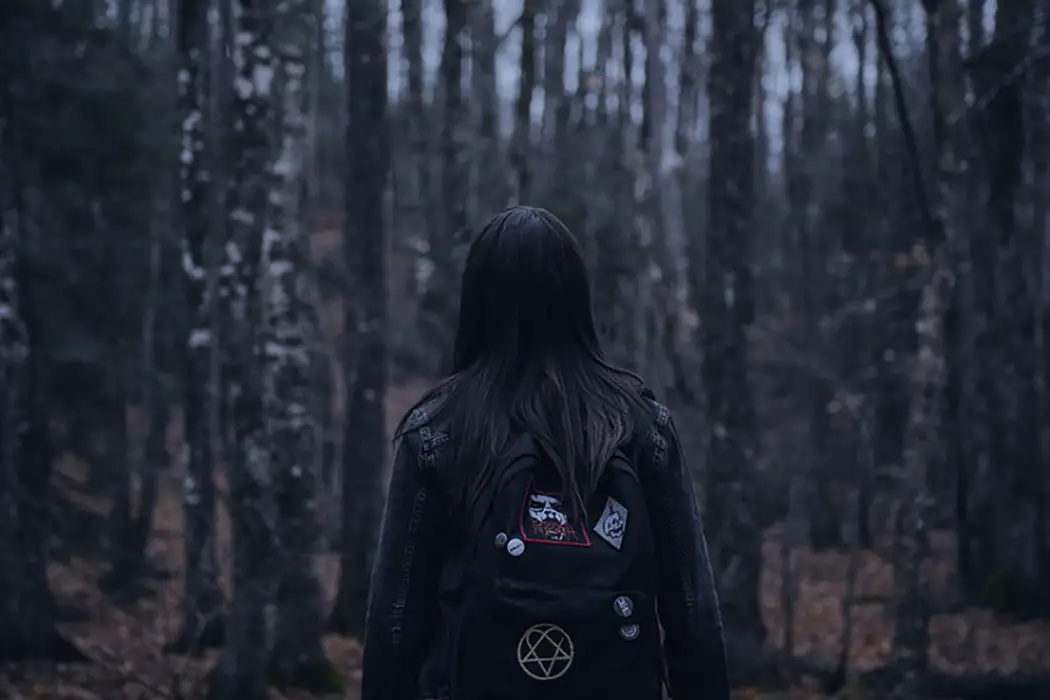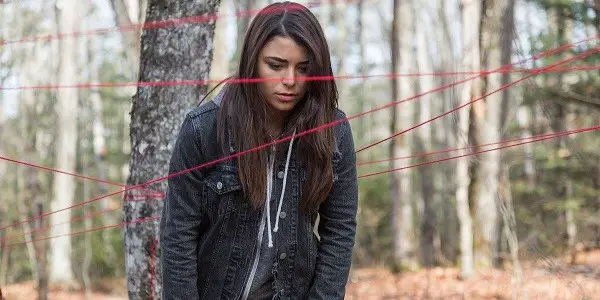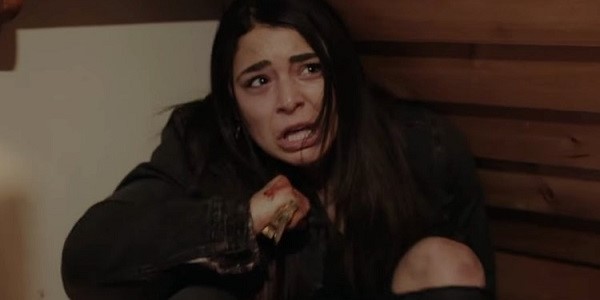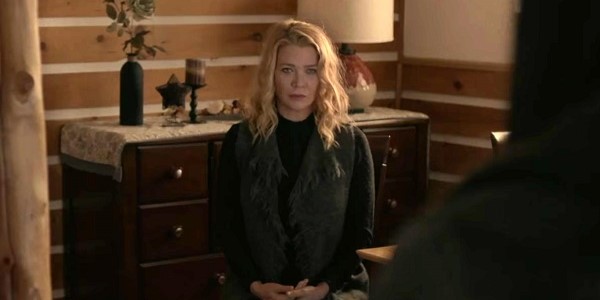PYEWACKET: Low-Key Folk Horror Serves Up Tension, Atmosphere & Chills

Lives by the sea in south-east England, with his wife,…
On the surface, it might not evoke anything particularly sinister – unlike The Exorcist or Halloween – but, if you know your history of witchcraft, Pyewacket is a smart title for this unsettling occult chiller from Canadian writer/director Adam MacDonald.
Yes, it might sound like the name of a terrible ’70s folk band, but Pyewacket was also one of the spirit familiars supposedly uncovered by ‘Witchfinder General’ Matthew Hopkins in 1644, as he went about his (entirely fraudulent) business in the English town of Manningtree, Essex. MacDonald should perhaps have made the reference more explicit in his film but, at worst, it’s a hide-in-plain-sight Easter Egg certain to strike a chord with dyed-in-the-wool horror fans.
Furious and unbalanced
Beneath that eye-catching title, Pyewacket is a film about grief and its terrible impact on a mother and daughter. Nicole Muñoz is Leah, a troubled young woman struggling to cope after the death of her father. She takes refuge in shouty death metal music and books about the occult, while her mum (The Walking Dead’s Laurie Holden) drinks far too much and appears permanently on the edge of nervous collapse.

The pair’s fraught relationship is damaged further when Mrs. Reyes (as Holden’s character is rather formally known) announces they are moving home, something which means Leah will have to change schools and most likely lose touch with her friends. Furious and unbalanced, the teenager wishes her mother dead and heads out into the woods that surround her new home to perform a black magic ritual she hopes will make it happen. She immediately regrets her actions but, when a mysterious presence starts going bump in the night, Leah realizes she may have summoned an evil spirit.
Falling apart
Grief as horror is nothing new and I’d be lying if I suggested Pyewacket was in the same league as, say, Don’t Look Now (1973), The Babadook (2014), or Antichrist (2009), but MacDonald’s sophomore feature (after 2014’s Backcountry) does have some impressive moves of its own. The most striking element is the relationship between Leah and her mother. They are like two survivors of a shipwreck hanging for dear life onto a piece of wreckage and occasionally fighting over it.
Mrs. Reyes is falling apart in front of our eyes. She’s bitter, angry, and you suspect alcoholism looms large in her future (if she even has one). The need to escape the rotten hand fate has dealt her and embrace a new start is palpable in everything she says and does. Holden – excellent here – gets the film’s two best lines, telling her daughter at one point as they battle over the move, “This place feels like your father’s funeral… every f*cking day.” And later, in the middle of another heated argument: “Moving on is impossible with you. Every time I look at you, I see your father’s face. God, I wish I could tear it off.” Powerful words, delivered with raw emotion.
Sinister setting
Apart from a couple of scenes, a lot of the film’s pyrotechnics are contained in this combustible central relationship. In fact, elsewhere Pyewacket is a low-key affair that gets by on atmosphere and suggestion rather than CG effects or action sequences, helped in no small part by the ambient swells and swoons of Lee Malia’s score. When MacDonald does break out the visual big guns, towards the end of the film, though, it’s worth the wait. The final 20 minutes or so are rewarding and harrowing, a grand finale fully earned by the director’s commitment to building everything that comes before it so painstakingly.

The film that Pyewacket reminds me of most is probably Robert Eggers’ The Witch (2015). Although the two are set centuries apart, Pyewacket shares the latter’s occult theme and sinister setting (an isolated homestead next to some woods), plus an ability to perhaps play fast and loose with what exactly is going on. In The Witch, we might well see a puritan New England family tormented and destroyed by Satan and a coven of his acolytes, but we could just as easily be witnessing their disintegration due to isolation, privation and religious mania. Here, even amidst the seeming supernatural craziness, MacDonald invites us to ponder if Leah is simply in the throes of a breakdown, at its center a horribly mistaken belief that her similarly distraught mother is the agent of all her woes.
Tension and unease
If Pyewacket has a problem, it’s that it serves up a couple of things we’ve seen rather too often before. Early on I groaned a little when Leah is slammed into by some random jock as she walks down a corridor at her high school. I know it’s shorthand to underline the character’s outsider status, but we see something similar so often in movies it’s long since become a terrible cliché. In fact, some bright spark should do a supercut of similar moments from films down the years. I suspect they’d uncover enough material for a whole new movie.

Likewise, whilst woods and forests are an effective setting for tales both horrific and bizarre (and were so even before the Brothers Grimm gave the world Hansel And Gretel in 1812), they have become a very overused one. Yes, we get it, gnarled trees and rotting carpets of autumnal leaves are spooky. And lingering tracking shots through such foreboding places are an immediate trigger for tension and unease. But isn’t it time horror writers and directors found fresher, more original locales for their stories to take place in?
Pyewacket: Vengeful spirit
MacDonald ultimately digs himself out of trouble with the authenticity he brings to the film’s exploration of witchcraft. The ritual performed by Leah, featuring mud, blood, milk and intricately-tied yarn, grounds otherwise supernatural proceedings firmly in some kind of recognisable reality, giving it proper dirt under its fingernails. The actual “doing” part of the occult is often glossed over in films, but MacDonald isn’t interested in shortcuts. Raising a vengeful spirit takes hard work and extracts a physical price. He wants you to see and feel that the teenager has taken time over this, has spilled blood to make it happen, despite her seeming volte-face later on.
Perhaps making more of the character Pyewacket’s history in the Witchfinder General story would have been interesting, but it could also have overcomplicated proceedings. MacDonald clearly wanted this to be a simple, heartfelt tale focusing on the disintegration of a mother/daughter bond, without too much background noise as a distraction. And he mostly succeeds in delivering just that.
What is your favourite film about the occult? The Blair Witch Project, Rosemary’s Baby, Häxan, or something else? Let us know in the comments below.
Pyewacket is on release now in a variety of formats. Check here for details.
Does content like this matter to you?
Become a Member and support film journalism. Unlock access to all of Film Inquiry`s great articles. Join a community of like-minded readers who are passionate about cinema - get access to our private members Network, give back to independent filmmakers, and more.
Lives by the sea in south-east England, with his wife, kids and cats. You are cordially invited to check out his film and comics-flavoured website - andywinter.online - and follow him on Twitter @andywinter1













